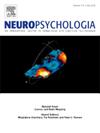Emotion recognition, symptoms of depression, and fluid intelligence after frontal lobe lesions
IF 2
3区 心理学
Q3 BEHAVIORAL SCIENCES
引用次数: 0
Abstract
Frontal lobe lesions have been associated with executive impairments and changes in emotional/social function. Empirical studies using emotion recognition tasks in people with frontal lesions have indeed reported impairments that are predominantly associated with medial lesions. However, work has also identified a fronto-parietal ‘multiple demand’ (MD) network that is engaged in a wide variety of cognitive tasks. Previous studies have shown that fluid intelligence (IQ) scores, treated as a marker of MD function, completely account for deficits in some, but not all, tests of putatively separate executive functions. Here, a group of 39 participants with frontal lesions showed significant impairments (relative to age, sex and premorbid IQ-matched controls) on a measure of fluid IQ and 4 emotion recognition tasks. They also had higher levels of depression symptoms. Depression symptoms did not account for emotion task impairment. Fluid IQ completely accounted for the impairments in one ‘emotion task’ of inferring the emotion likely to be experienced in each of a series of vignettes. However, whilst fluid IQ was correlated with the other emotion measures (tests of categorising emotional expression from faces, eyes, and non-verbal vocalisations), significant variance was left unexplained. The significant intercorrelations between these residual scores was suggestive of a common ‘non-fluid IQ’ factor that may have an association with left lateral frontal lesions. The results are discussed in terms of the importance of identifying common general cognitive influences on tests of ostensibly specific functions in clinical assessments and research studies.
额叶损伤后的情绪识别、抑郁症状和流体智力。
额叶损伤与执行障碍和情绪/社会功能的变化有关。对前额叶病变患者进行情绪识别任务的实证研究确实报告了主要与内侧病变相关的损伤。然而,研究也发现了一个额顶叶“多重需求”(MD)网络,它参与了各种各样的认知任务。先前的研究表明,流体智力(IQ)分数,被视为MD功能的标志,完全解释了一些(但不是全部)被认为是单独的执行功能测试的缺陷。在这里,一组39名额叶损伤的参与者在流体智商和4项情绪识别任务中表现出明显的损伤(相对于年龄、性别和发病前智商匹配的对照组)。他们也有更高程度的抑郁症状。抑郁症状不能解释情绪任务障碍。流动智商完全解释了一项“情绪任务”的缺陷,该任务是推断一系列小插曲中每个人可能经历的情绪。然而,尽管液态智商与其他情绪测量(通过面部、眼睛和非语言发声对情绪表达进行分类的测试)相关,但显著差异仍未得到解释。这些剩余分数之间的显著相互关系暗示了一种常见的“非流体智商”因素,可能与左额叶外侧病变有关。研究结果讨论了在临床评估和研究中识别表面上特定功能测试中常见的一般认知影响的重要性。
本文章由计算机程序翻译,如有差异,请以英文原文为准。
求助全文
约1分钟内获得全文
求助全文
来源期刊

Neuropsychologia
医学-行为科学
CiteScore
5.10
自引率
3.80%
发文量
228
审稿时长
4 months
期刊介绍:
Neuropsychologia is an international interdisciplinary journal devoted to experimental and theoretical contributions that advance understanding of human cognition and behavior from a neuroscience perspective. The journal will consider for publication studies that link brain function with cognitive processes, including attention and awareness, action and motor control, executive functions and cognitive control, memory, language, and emotion and social cognition.
 求助内容:
求助内容: 应助结果提醒方式:
应助结果提醒方式:


